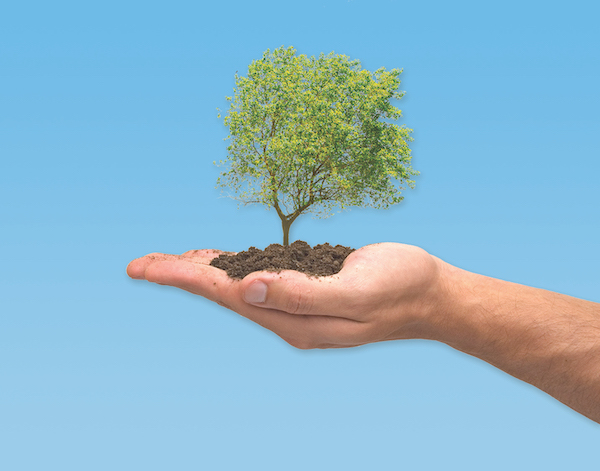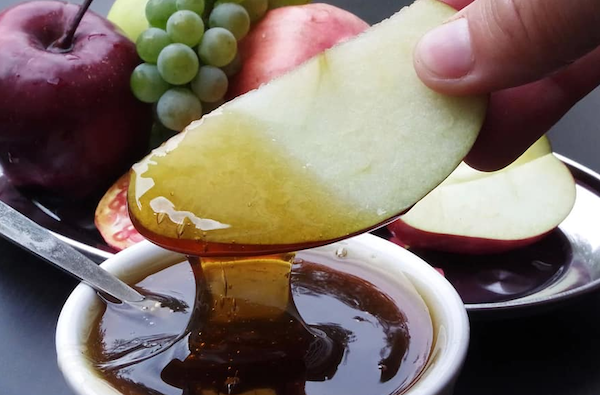Tu b’Shevat is a popular day to go into the fields and plant saplings. (photo from usa.jnf.org)
‘In Israel, just before the Hebrew month of Shevat, the landscape begins to change. It has been winter; the fruit trees bare, their leafless, light grey branches silhouetted against dark clouds. Then, as Shevat is ushered in, they begin to bud, and reddish leaflets burst forth. Fields that have been covered with pale crocuses, white narcissus and cyclamens give way to red anemones, tulips and broom bushes starred with flowers. And the almond trees burst into blossom – the first harbinger of spring. It is at this time we celebrate Tu b’Shevat, the 15th of Shevat, which is known as the New Year of the Trees.
Tu b’Shevat, which falls this year on Jan. 17, is mentioned in the Mishnah as one of the four “natural” new years. The first of Nisan is the “new year for Jewish kings and seasonal feasts”: that is, for calculating the reigns of Israelite kings and determining the cycle of calendar festivals. The first of Elul is the new year “for tithing cattle” and the first of Tishri is the new year for calculating septennial cycles and 50-year jubilees.
The new year for the trees was moved from the first of Shevat to the 15th in accordance with the opinion of Rabbi Hillel (30 BCE – 10 CE), for it is then that the sap begins to rise with the full moon, in Israel’s fruit trees. The Babylonian and Jerusalem Talmuds also designate Tu b’Shevat as the date to calculate taxes on fruit: “You shall tithe all the yield of your seed, which comes forth from the field year by year.” (Deuteronomy 14:22)
During the days of winter, Israel’s fruit trees are dormant. It is wet and cold and, because of the low temperatures, the trees cannot absorb the nutrients from the soil. But, regarding the 15th of Shevat: “Till this day [the trees] live off the water of the past year; from this day on, they live off the water of this year.” (Jerusalem Talmud, Rosh Hashanah 1.2)
This date is the start of the fruit’s formation. Arabs also mark it, calling it “the second ember,” when fruit trees begin to absorb water. According to Arab folklore, there are three “embers,” which began as fire falling from the sky and changed to caterpillars. The first falls from the sky when the earth begins to warm up; the second when the warmth spreads. They follow this with a third “ember,” as summer begins.
Tu b’Shevat is one of Judaism’s popular celebrations that does not involve special synagogue services. It is a day when it is customary to eat the fruits of Israel: apples, almonds, carobs, figs, nuts and pomegranates. Many scholars stay up late on the eve of the holiday, reciting biblical passages dealing with fruits or the earth’s fertility. They read from Genesis how trees were created along with all the plants of the earth; from Leviticus, the Divine promise of abundance as a reward for keeping the commandments; and from Ezekiel 17, the parable of the spreading vine, symbolizing the people of Israel.
Kabbalists hold a special seder for Tu b’Shevat and they celebrate, not so much the new year of the trees, but the New Year of the Tree, meaning the Tree of Life, which is rich with mystical connotations. At the seder, they drink four cups of wine, beginning with white wine and ending with red, with the second cup a mixture more of white and the third more of red wine. It is rather like how the landscape changes from white (the pale narcissus and crocus) to red (anemones and tulips) as Tu b’Shevat approaches.
Tu b’Shevat is a popular day to go into the fields and plant saplings. Over the last several decades, Israeli schoolchildren have helped Keren Kayemeth, the Jewish National Fund, plant 130 million trees, many of them on Tu b’Shevat, and these evergreens have become the backbone of the reforestation program.
Tu b’Shevat affirms that the soil of Israel is holy. And the New Year of the Trees reminds us annually of the wonder of God’s creation.
Dvora Waysman is a Jerusalem-based author. She has written 14 books, including The Pomegranate Pendant, which was made into a movie, and her latest novella, Searching for Sarah. She can be contacted at [email protected].


